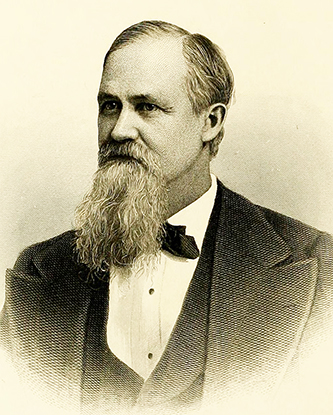8 May 1831–27 July 1902

Eugene Grissom, physician and psychiatrist, was born near Wilton in Granville County, one of seventeen children of Wiley Hawes and Mary Bobbitt Grissom. His grandfather had changed the family name from Gresham to Grissom. Eugene attended Graham High School and taught for a brief time at age sixteen. In 1852 he was appointed deputy clerk of Granville County, and in 1853 he was elected clerk of the superior court. For a while he read law, but in 1855 he began studying medicine at the University of Pennsylvania where he received an M.D. degree in 1858. He also earned diplomas from the Philadelphia School of Anatomy and the Parrish School of Practical Pharmacy. He then returned to North Carolina to practice.
When the Civil War began, Grissom declined an appointment as surgeon and obtained the captaincy of Company D of the Thirtieth North Carolina Regiment. He was wounded just before the opening of the Seven Days' Battle around Richmond, and while convalescing in Richmond he was elected to the House of Commons. Reelected in 1864, Grissom was a member of the military committee for both terms, and one of his proposals resulted in the law appropriating one million dollars for the relief of indigent families of soldiers. Between sessions he served as army surgeon with the rank of major. In 1865, Grissom was a member of the constitutional convention ordered by President Andrew Johnson and served on the committee that drafted the repeal of the secession ordinance.
For the next three years Grissom practiced medicine. In 1868, he was appointed superintendent of the North Carolina psychiatric hospital at Raleigh. While serving in that capacity he introduced new methods of treating the mentally ill, worked to improve the care and general health of his patients, and increased the physical facilities of the institution. When she visited the psychiatric hospital in 1877, Dorothea Dix complimented Grissom enthusiastically for "promoting the comfort of the insane and applying all the means at your command for their restoration." Chiefly through his efforts the General Assembly appropriated money for a western psychiatric hospital for whites at Morganton and one for blacks at Goldsboro. In his spare time he served as a member of the State Board of Agriculture, as surgeon-general of the state guard (1882–88), and as a trustee of The University of North Carolina (1879–90).
In June 1889 Grissom was tried for "gross immorality in connection with certain female attendants," "mismanagement" and "cruelty" to his patients, and "misappropriating the property" of the psychiatric hospital. The trial lasted four weeks and created the greatest excitement. Former Governor Thomas J. Jarvis was chief counsel for the defense, and eventually Grissom was found innocent on all charges. He resigned a month after the trial and moved his practice to Denver and Colorado Springs, Colo. He died at age seventy-one on a visit to Washington, D.C.
Dr. Grissom's work with people with mental illnesses won him national recognition. He contributed numerous articles—generally on mental illness—to medical journals in North Carolina and some to the New England Medical Monthly and the American Medical Journal. His more important articles were republished in pamphlet form, among them Mania Transitoria, Mechanical Protection for the Violent Insane, The Semeiology of Insanity, and Deafmutism. In 1882, Grissom was elected first vice-president of the American Medical Association; during his long membership in that group he was chairman at one time or another of most of its committees. In 1887, he was president of the Association of Superintendents of American Insane Asylums (now the American Psychiatric Association). He also served as president of the Raleigh Academy of Medicine.
Dr. Grissom was a Methodist, an active Mason (attaining the 33rd degree in 1884), and a Republican. On 10 Jan. 1866 he married Mary Ann Bryan, daughter of Michael Bryan, a North Carolina planter. They had five children: Robert Gilliam, Eugene, Mary Theodora, Adelaide, and Lillian.